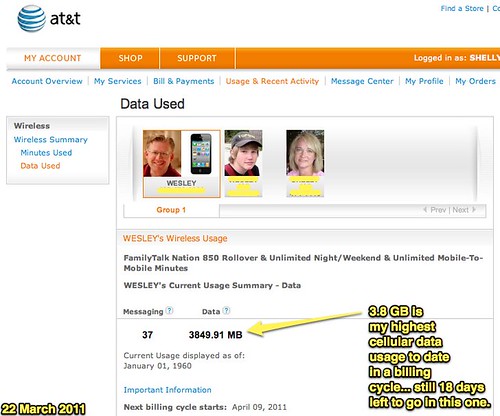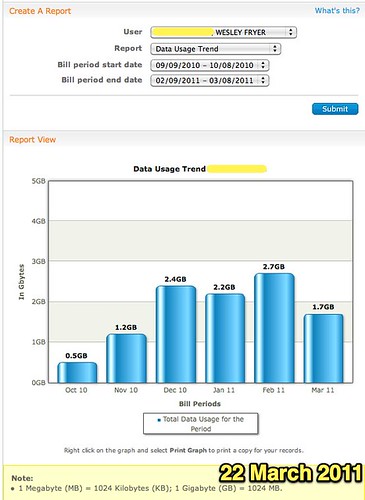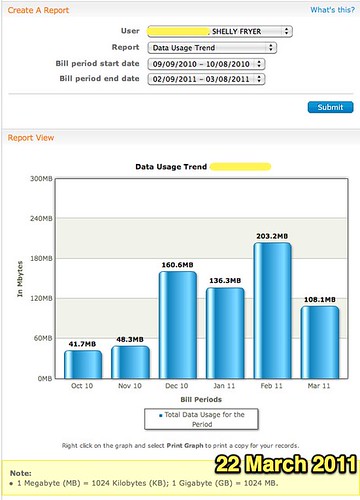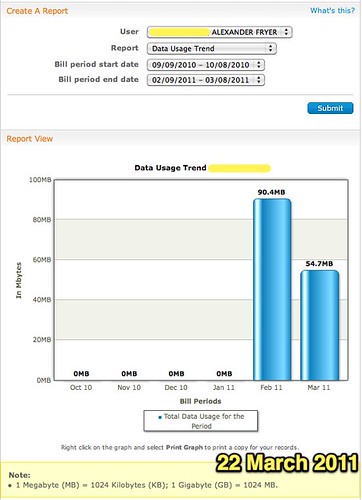Last week’s Engadget article, “AT&T tells customers using unauthorized tethering methods to pay up or stop” got me wondering, just how much mobile bandwidth IS our family utilizing each month now that we have three iPhones among us? This month, with 18 days left to go in our billing cycle, I’m definitely on my way to hitting a new bandwidth consumption record with 3.8 GB used so far on my iPhone.
AT&T provides a helpful analytic tool on its US wireless customer website (requires login) to view current as well as historical cellular data usage. This graph of my iPhone’s data consumption history shows since December 2010 I’ve averaged about 2.5 GB of usage per month.
My wife, on the other hand, is a light iPhone data user and averages less than 200 MB (approximately 0.2 GB) per month.
My son, who inherited my old iPhone for Christmas last year, appears to be averaging about 100 MB per month.
AT&T’s purchase of T-Mobile USA this week means the carrier will be (pending FCC approval) the largest US cellular provider by a long shot. It’s likely we’ll see AT&T continue to put limits on cellular data usage plans for all its new customers, as well as current ones.
One of the most interesting comments in the Engadget article referencing MyWi I linked to first in this post was the following, from Disqus user TwinSpin. I’ve pasted the comment in this post without edits, except for profanity which I’ve changed to asterisks. Although there is no way of knowing for sure if this person is an AT&T employee, their opinions on this topic are interesting and worth considering:
I feel obligated to jump in here and state a few opinions of MY OWN. First off, i work for AT&T as a sales rep in a corporate store. It sucks to see my company take this approach, but I can see why they are doing it. Ive heard facts that the top 2% of users account for 50% of the traffic. Thats a gross amount of data, that is obviously abusing the TOS. At this point, I wish to jump in and state that I use and Iphone 4 on an old grandfathered unlimited data plan. and YES i did jailbreak and have MiWI installed. When I first read this article (didnt come across it on internal channels) I was like “oh ****” but why? After a minute reflecting about it, well I came to the conclusion..”it was nice while it lasted.” People ARE cheating the system, including myself. Im guilty, but the difference is that I will man up about it and not complain about a company changing its approach to enforce fair usage, and stop abusers. People have managed to cheat the system and use tethering without paying for the capability…what do we call that, of yes stealing. If i got caught speeding and was pulled over, I would admit it and take the consequences. Bottom line, not everyone will get affected by this. I agree its probably triggered from usage per month, or by servers beings accessed. By the way, AT&T is NOT in a financial burden, so the theory this has anything to relate to network upgrades and costs involved is ridiculous. The question of whether AT&T can do this automatically if you continue to violate your ToS, its valid. You are breaking the rules by doing so. Heres an example. If you pop your sim card into an Iphone, it will automatically add the data plan to your account, even if you did not have one previously. The fact that you started using the iphone as your new phone accepts the terms and conditions, thats the way I understand it. Therefore if you tether without paying for it, and get caught, expect to face the consequences. But what do i know, I just work for a Corporate Giant that is inherently evil….To be honest, to many people are self entitled these days and are always looking for more for free. Always has the hand out, but doesn’t like getting told no. Flame on
Personally, I don’t think anyone is “cheating AT&T” if they are using cellular bandwidth they’ve paid for on another device via a tethering scheme like MyWi. Skeptickl’s comment and analogy to water is on target. Customers pay for water usage, they aren’t charged by the local water company for installing a new sink in their house. In response to the above comment, Skeptickl wrote:
Twin, I think you’re feeling guilty for using your unlimited grandfathered plan. But AT&T is wrong here. Like a water company saying hey, you gotta pay extra if you put in another kitchen sink. You pay for what you use. Period.
“Ive heard facts that the top 2% of users account for 50% of the traffic. Thats a gross amount of data, that is obviously abusing the TOS. ”
We pay city state and federal taxes to maintain roads. If a salesman drives those roads day and night, using a disproportionate amount of travel he still doesn’t pay higher taxes (except for fuel.) Individual usage only matters to providers if it affects performance. Providers readily acknowledge their networks capable of handling present and future loads.
Eric Swinson’s comment to this thread is also interesting.
The number one flaw in the whole 2% argument is that for the most part everyone is on a data cap. So what your are really saying is that 2% of the people are actually using close to the bandwidth they are paying for and if everyone used to the limits of what they actually paid for then the system could not support it. So basically your oversubscription rate on your bandwidth to customers is out of whack.
AT&T needs to decide if they want to charge for the water in the well or the size of the bucket you use to fetch it but not both.
Has AT&T oversubscribed iPhone users? Another way of asking this is, could AT&T’s cellular data network sustain maximum utilization (2 GB or 5 GB per iPhone user) if all current customers consumed data at the “maximum allowable quota?” I’m not sure but I’m inclined to think they couldn’t.
This is very interesting, because the number one criticism AT&T sales reps liked to levy against OneNet (during 2006-2008 when I worked for AT&T as a “state education advocate”) was that OneNet was/is “over-subscribed.” OneNet is our state network and ISP / Internet provider for many K-12 schools in Oklahoma. OneNet leases lines from AT&T at a mandated discount and then resells that service to schools and other organizations. I don’t have the conclusive evidence at my fingertips, but my sense is that just like OneNet has historically (in some situations) over-subscribed its K-12 educational network when it comes to bandwidth, AT&T has done the same thing today with its iPhone consumers. This isn’t precisely “the pot calling the kettle black,” since the folks I worked with in AT&T weren’t consumer cellular folks, but it is the same company. Very interesting dynamics.
I’m going to continue monitoring our family’s monthly cellular data / bandwidth consumption. Judging by these recent graphs, while I’m certainly using a lot of data each month it doesn’t look like I’m among the alleged “2% of users consuming 50% of the traffic.” It’s almost unbelievable that when the iPhone was announced in 2007, AT&T actually provided unlimited data contracts for customers. I’m still “grandfathered” on that contract, but I’ve heard enough stories from people I trust to believe “unlimited” today really means “don’t exceed 5 GB of monthly traffic, or we’re gonna come calling for more money– or kick you off our network forever.” The Engadget article I referenced first in this post doesn’t indicate WHICH AT&T MyWi-tethering customers are getting a “friendly SMS” asking them to pay up for tethering, but I’d bet it’s users who are exceeding 5 GB per month. It’s hard to tell if you don’t know someone who has actually received one of those messages, and can’t look directly at their monthly cellular data usage reports.
As a final bandwidth-related aside, I’ll comment that I’m amazed to learn Cox Communications is now offering an “ultimate” tier to its high speed, home Internet options in the Oklahoma City area. Our family is currently on the 3rd (or “Premier”) tier which provides maximum downstream bandwidth of 25 Mbps and 2 Mbps upstream. That should be plenty for our usage needs, including H.323 videoconferencing, but in reality I’ve found “normal” speeds I can get are much less. This depends on a lot of factors, of course. That “tier” of service costs about $65 per month. The new, 4th tier of high speed access (“Ultimate”) provides top downstream bandwidth of 50 Mbps and 5 Mbps upstream for $100 per month. It’s very illuminating to see the HUGE disconnect between these connectivity options for consumers in HOMES and the prices paid by our SCHOOLS for dedicated Internet connections. Bandwidth I enjoy at my house can (and does) easily outstrip available bandwidth in many (if not most) of our Oklahoma K-12 schools today. I wonder when this “digital divide” will be remedied? I wonder how many students in the months and years ahead, if this digital divide isn’t fixed and schools don’t embrace BYOD (“bring your own device”) initiatives for student mobile learning, will grow to prefer their own commercial/consumer cellular data service over that provided by the school? (Of course school-provided and monitored content filtering isn’t available for student-owned and provided devices in most cases.)
We live in interesting times.
Hat tip to Eric Hileman for sharing the initially referenced Engadget article via Twitter.
Technorati Tags:
att, bandwidth, at&t, mywi, tether, tethering, engadget, consume, tier, cox, onenet





Comments
2 responses to “iPhone Tethering, Cellular Bandwidth Consumption, & the Home / School Internet Access Divide”
FYI: Tethering your iPhone in Canada has no additional charge, but we have monthly usage limits in place, and if you go way over, you can pay a fair bit.
I agree 100% with the notion that I am paying for a certain amount of bandwidth and how I use it (between my mobile, desktop and laptop) is my choice. If I go nuts and use tons of bandwidth, I get charged for it. So, it is win-win for the telecom giants .. give us what we need and stop trying to bully us.